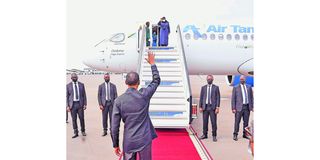Key lessons for Tanzania from neighbouring Rwanda

President Samia Suluhu Hassan and Rwanda President Paul Kagame bid each other farewell at Kigali International Airport after Ms Hassan completed her two-day visit to Rwanda on Tuesday. PHOTO/ STATE HOUSE
What you need to know:
- They include developing infrastructure and putting in place a conducive environment for investment and economic growth
Dar es Salaam. Following President Samia Suluhu Hassan’s official visit to Rwanda where she got to talk to Rwanda President Paul Kagame on strengthening bilateral economic ties between the two East African nations, a lot has got known regarding what Tanzania can learn from its EAC partner state.
The Minister for Foreign Affairs and East African Cooperation, Ms Liberata Mulamula, said in Dar es Salaam yesterday that some of the lessons learnt during the visit include developing infrastructure and putting in place a conducive environment for investment and economic growth.
According to Ms Mulamula, it was also useful to note how bolstering Export Processing Zones (EPZs) can boost the country’s chances of attracting investors.
“We developed our own EPZs some years back; but it looks like there were some issues that needed to be worked on,” said Ms Mulamula, briefing journalists on major takeaways from President Hassan’s just-ended two-day visit to Rwanda.
In efforts to improve Rwanda’s balance of payments, factories operating under the Special Economic Zones system in that country are required to export at least 40 percent of their products.
Until 2016, figures from the Rwanda Development Board (RDB) show that Tanzanian businesses had invested slightly over $80 million in Rwanda’s economy.
She said the Tanzanian delegation saw just how having a conducive investment environment – including economic infrastructure like roads, water and electricity – helps to attract investors.
Business environment
Rwanda is in a league of its own when it comes to improving the business environment.
It jumped an impressive 76 places - from 143 to 67 - on the World Bank’s Doing Business 2010 Report, becoming the first African country to top the list as the world’s biggest business reformer.
However, Rwanda did not rest on its laurels - and has continued to improve year after year. It was the second easiest place to do business in in Africa - and the 38th globally in the 2020 World Bank Doing Business Report.
The Reports, which are compiled annually, assess 190 countries using 10 indicators in business regulation. These include starting a business, dealing with construction permits, getting electricity, registering property, getting credit, protecting minority investors, paying taxes, trading across borders, enforcing contracts, and resolving insolvency.
Rwanda was ranked second in Africa after Mauritius - and first in the East African Community. It is also the only low-income country in the Top 50.
The Report also has Rwanda’s global ranking drop to 38th place from 29th last year, mainly caused by the World Bank’s change in reporting methodology.
With President Hassan stepping up efforts to improve Tanzania’s business environment since she assumed office on March 19, 2021, analysts believe this should rank high on the list of takeaways.
Most of the shared views stem from President Hassan’s visit to two strategic factories established in Rwanda by foreign investors: a Volkswagen car assembly, and the Mara Phone Factory.
Analysts expressed mixed sentiments, following Rwanda’s performance as an ideal investment hot-spot, with most stating that Tanzania as East Africa’s second-biggest economy needs to be at the forefront in attracting Foreign Direct Investments (FDIs).
During a discussion on the social audio space ‘Kumekucha’ on ClubHouse, the Member of Parliament for Nzega Rural, the former Tourism minister Hamis Kigwangalla, commented on the matter, saying Tanzanian laws, culture and political spectrum play a big role in dictating the country’s direction for socioeconomic development.
“We need leaders who have the intention and hunger to see Tanzania develop. What will make us succeed is not our geographical position or our ports, but systems that are deeply entrenched in our financial mechanism and cultural alignment. That’s how we will attract investors like the Mara Group,” he counselled.
Kigwangalla - who is also a businessman and the proprietor of a few investments in Tanzania - said that during his time as Tourism minister, he held meetings with investors. One of the things they complained about was high taxes. “Investors are made to pay multiple taxes, some of them inordinately high. This discourages both local and foreign investors from investing in Tanzania. Such taxes and bureaucratic tendencies have an adverse impact on the tourism sector, with small tour companies failing to keep the business going,” he stressed. Kigwangalla suggested possible solutions to some of the problems that impede Tanzania’s business potential. According to him, a cultural revolution is very important. “This can be passed through our education system for future generations,” he said.
He added that leadership ideology (socialism) and economic ideology need to go hand in hand. “We can have Ujamaa along a free market economy.”
Referencing a book titled ‘Why Nations Fail’ by economists Daron Acemoglu and James Robinson, Kigwangalla said Tanzania has what it takes to become prosperous. However, there were a few areas - especially in leadership, education, and culture - that need to be revisited.
One of the attendees of the social audio space, Peter Serukamba said Tanzania has advantages over the other countries in the region: geographical edge and natural resources. “Why haven’t these been fully utilized? We need to look at where we have failed in this... The impediments to investment, unpredictable laws, being overly skeptical about investors’ motives,” he lamented.
Plentiful opportunities
Being the second largest economy in East Africa, Tanzania has a lot to offer and benefit from its ties with Rwanda.
According to Ms Mulamula, during the visit, Tanzania secured a number of investment opportunities that it needs to tap - especially in providing raw materials for Rwandan industries, as well as preparing a curriculum for teaching Swahili in that country.
“During the visit, the entourage included ministers from strategic sectors, including the ministers for Works, Transport and Communication; for Industry and Trade; Mand for Investments. There also were heads of the Tanzania Ports Authority (TPA), Air Tanzania Company Limited and Tanzania Railway Corporation (TRC).
She noted that the trip was in response to an invitation from Rwanda President Paul Kagame that also focused on strengthening neighbouring relations but also an opportunity for the President to introduce herself to President Kagame and his people at large. Following the State visit to Rwanda, President Hassan has finalized her trips to neighbouring countries except Southern Sudan.
“Both the President’s talked about pushing strategic projects in both countries including the optic fibre backbone by having an agreement that ensures Rwanda uses our fibre to strengthen its information sector,” she said.
Further President Hassan toured its automobile industries and learnt that Tanzania could be a potential market taking into consideration that they produce three to six for their own use but if Tanzania became a reliable market they could increase. In view of this, she said President Hassan directed ministers in charge of the sector to follow up and identify markets for the cars.
Ms Mulamula said Rwanda also had a mobile phone industry identified as Maraphone, a good thing that has created employment especially for women.
“Tanzania could also provide granite minerals for production of phones and car batteries which is an opportunity to export raw materials,” she said.
She said on medicine, they agreed that both countries could assist each other with Covid-19 facilities and that was why it was important to sign an MoU to signal the agreement.
Meanwhile, she said they also agreed to cooperate in the transport sector especially as Rwanda depends on Tanzania’s Dar es Salaam port by 90 percent for both imports and exports. According to her Rwanda also requested to be allowed to use the Tanga port which they have started.
On the issue of Kiswahili language, she said Rwanda said it planned to make it a national language and include it in its education curriculum of which President Kagame requested for experts from Tanzania to help in its preparation
About immigration, she said the immigration department has been directed to facilitate smooth passing of people from both countries.





